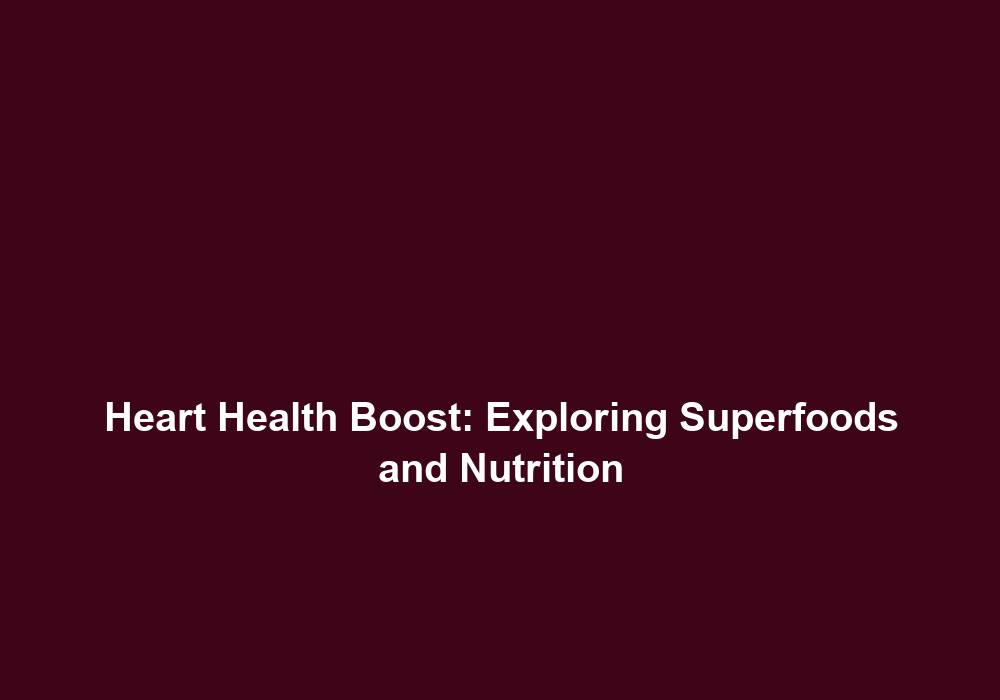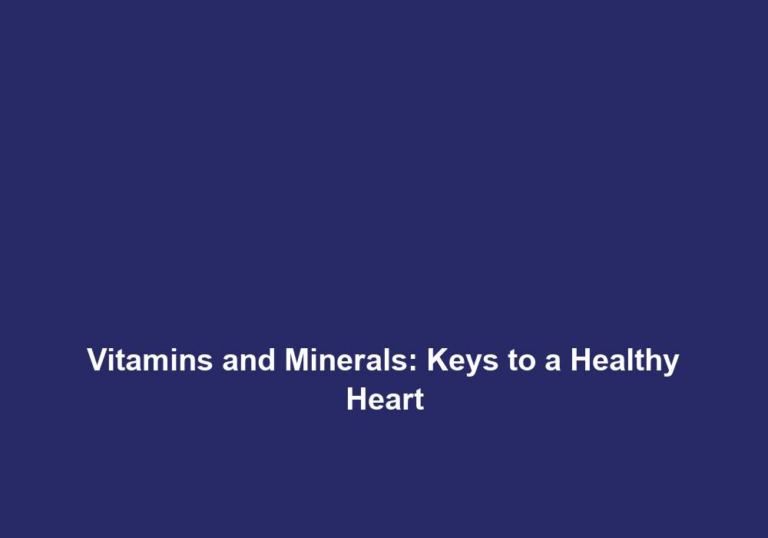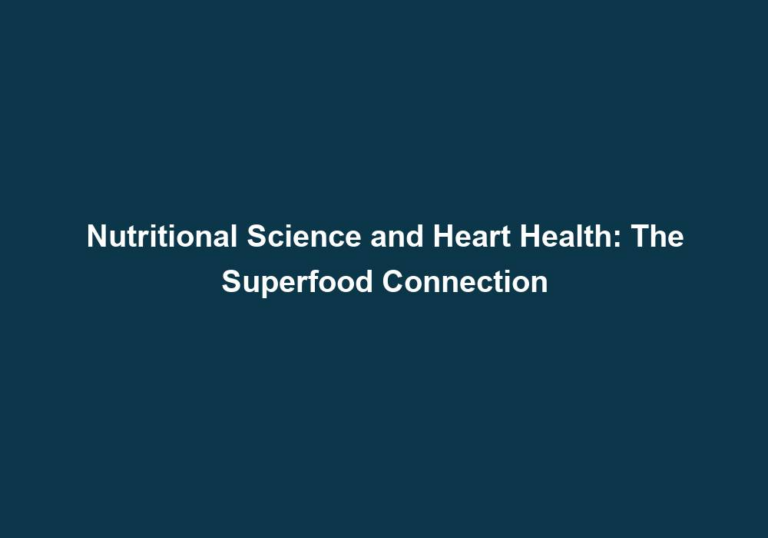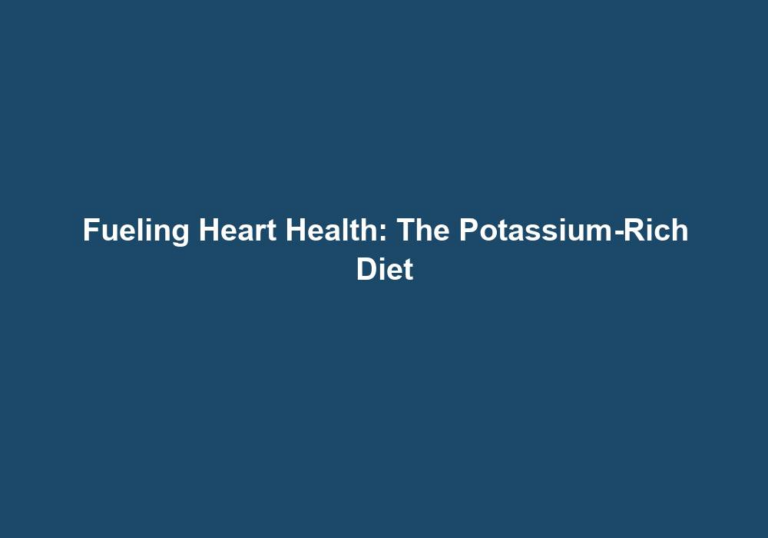Heart Health Boost: Exploring Superfoods and Nutrition
Heart health is a vital aspect of overall well-being, and taking care of our cardiovascular system should be a top priority. Thankfully, incorporating superfoods and proper nutrition into our diets can significantly contribute to maintaining a healthy heart. In this article, we will delve into the world of superfoods and explore the various ways they can boost heart health.
Understanding the Importance of Heart Health
Before we jump into the specifics of superfoods, it is crucial to understand why heart health matters. The heart is responsible for pumping blood and oxygen throughout our bodies, ensuring that all our organs and tissues function optimally. When the heart is not in good shape, it can lead to serious health issues such as heart disease, high blood pressure, and even heart attacks.
Maintaining a healthy heart is essential for a long and fulfilling life. By prioritizing heart health, we can reduce the risk of developing chronic conditions and improve overall well-being. A healthy heart ensures that oxygen and nutrients are delivered to every part of the body, supporting optimal organ function. Additionally, a strong cardiovascular system helps maintain healthy blood pressure levels and prevents the formation of dangerous blood clots. By understanding the importance of heart health, we can make informed choices about our diet and lifestyle to protect this vital organ.
What are Superfoods?
Superfoods are nutrient-dense foods that offer exceptional health benefits. They are packed with a variety of vitamins, minerals, antioxidants, and phytochemicals that support overall well-being. When it comes to heart health, certain superfoods are particularly beneficial due to their ability to lower cholesterol, reduce inflammation, and improve blood circulation.
Superfoods are not just a marketing buzzword; they are backed by scientific evidence for their health benefits. These foods have a high concentration of nutrients compared to their calorie content, making them an excellent choice for promoting heart health. By incorporating superfoods into our diets, we can provide our bodies with the necessary nutrients to maintain optimal heart function and reduce the risk of cardiovascular diseases.
Incorporating Superfoods for a Healthy Heart
- Berries: Blueberries, strawberries, raspberries, and blackberries are not only delicious but also rich in antioxidants. These compounds help prevent oxidative stress and inflammation, reducing the risk of heart disease.
- Blueberries, in particular, are known for their high levels of anthocyanins, which have been shown to improve heart health by reducing blood pressure and improving arterial function.
- Strawberries are packed with vitamin C, fiber, and antioxidants that can help lower LDL cholesterol levels and reduce the risk of heart disease.
- Raspberries contain ellagic acid, a compound that has been found to have anti-inflammatory properties and may help reduce the risk of heart disease.
- Blackberries are rich in vitamins A, C, and E, as well as fiber and antioxidants, all of which contribute to heart health by reducing inflammation and oxidative stress.
- Fatty Fish: Fish like salmon, mackerel, and sardines are excellent sources of omega-3 fatty acids. These healthy fats can reduce triglycerides, lower blood pressure, and decrease the risk of abnormal heart rhythms.
- Omega-3 fatty acids, specifically EPA and DHA, have been extensively studied for their heart-protective benefits. They can help reduce inflammation, improve blood vessel function, and prevent the formation of blood clots.
- Consuming fatty fish at least twice a week can provide an adequate amount of omega-3 fatty acids to support heart health.
- Other sources of omega-3 fatty acids include chia seeds, flaxseeds, and walnuts, which can be beneficial for those who do not consume fish.
- Leafy Greens: Spinach, kale, and other leafy greens are packed with vitamins, minerals, and fiber. They are also rich in nitrates, which can help lower blood pressure and improve overall heart health.
- Leafy greens are an excellent source of magnesium, a mineral that plays a crucial role in maintaining a healthy heart rhythm and regulating blood pressure.
- These greens are also high in antioxidants, such as lutein and zeaxanthin, which have been associated with a reduced risk of heart disease.
- Incorporating leafy greens into salads, smoothies, or cooked dishes can be an easy and delicious way to boost heart health.
- Nuts and Seeds: Almonds, walnuts, chia seeds, and flaxseeds are all great choices for heart health. These foods are high in fiber, healthy fats, and antioxidants, which can help lower bad cholesterol levels.
- Almonds are rich in monounsaturated fats, fiber, and vitamin E, all of which contribute to heart health by reducing LDL cholesterol and promoting healthy blood vessels.
- Walnuts are an excellent source of omega-3 fatty acids, which have been shown to decrease inflammation and improve heart health.
- Chia seeds and flaxseeds are packed with fiber and omega-3 fatty acids, making them beneficial for heart health and overall well-being.
- Adding a handful of nuts or seeds to your daily diet can provide a nutritious snack that supports heart health.
- Oats: Starting the day with a bowl of oats can do wonders for heart health. Oats are rich in soluble fiber, which helps reduce cholesterol levels and promote a healthy cardiovascular system.
- The soluble fiber in oats, known as beta-glucan, forms a gel-like substance in the digestive system that binds to cholesterol, preventing its absorption into the bloodstream.
- Regular consumption of oats has been shown to reduce LDL cholesterol levels and improve overall heart health.
- Adding fruits or nuts to your oatmeal can further enhance its nutritional value and taste.
- Legumes: Beans, lentils, and chickpeas are excellent sources of plant-based protein and are low in saturated fats. They are also high in fiber and can help lower cholesterol levels.
- Legumes are rich in soluble fiber, which helps reduce the absorption of cholesterol and maintain healthy blood sugar levels.
- They are also a good source of folate, a B-vitamin that plays a crucial role in heart health by reducing homocysteine levels, a risk factor for heart disease.
- Including legumes in your diet can provide a nutritious and filling alternative to animal-based protein sources.
- Dark Chocolate: Good news for chocolate lovers! Dark chocolate, in moderation, can provide heart-protective benefits. It contains flavonoids that help reduce inflammation and improve blood flow.
- Dark chocolate with a high cocoa content (70% or more) is rich in flavonoids, specifically flavanols, which have been shown to have antioxidant and anti-inflammatory effects.
- Consuming moderate amounts of dark chocolate has been associated with a reduced risk of heart disease and improved heart health markers, such as blood pressure and blood flow.
- It is important to choose high-quality dark chocolate and consume it in moderation due to its calorie content.
- Green Tea: Swap your regular cup of tea or coffee with green tea. It is loaded with antioxidants and catechins, which can improve heart health by reducing LDL cholesterol and triglyceride levels.
- Green tea contains catechins, a type of antioxidant that has been shown to reduce LDL cholesterol levels and improve overall heart health.
- The catechins in green tea also have anti-inflammatory and anti-thrombogenic properties, which can help prevent the formation of blood clots.
- Drinking green tea regularly, either hot or cold, can be a refreshing way to support heart health.
The Role of Nutrition in Heart Health
Apart from superfoods, overall nutrition plays a significant role in maintaining a healthy heart. Here are some nutritional guidelines to follow:
1. Limit Saturated and Trans Fats
Saturated and trans fats found in fried foods, processed snacks, and fatty meats can increase bad cholesterol levels and contribute to heart disease. Opt for healthier alternatives such as lean meats, fish, and plant-based fats like avocado and olive oil.
- When cooking, choose healthier cooking methods such as baking, grilling, or steaming, instead of frying.
- Replace butter and margarine with healthier fats like olive oil, avocado oil, or coconut oil.
- Choose lean cuts of meat or poultry and remove visible fat before cooking.
2. Increase Fiber Intake
Fiber-rich foods, such as whole grains, fruits, vegetables, and legumes, help lower cholesterol levels and regulate blood sugar levels. Aim for at least 25-30 grams of fiber per day.
- Include whole grains like brown rice, quinoa, whole wheat bread, and oats in your meals.
- Opt for fruits and vegetables with edible skins or seeds to maximize fiber intake.
- Experiment with different types of legumes, such as lentils, black beans, and chickpeas, in soups, stews, or salads.
3. Watch Sodium Intake
High levels of sodium can raise blood pressure, increasing the risk of heart disease. Limit your sodium intake by avoiding processed foods and opting for fresh, whole ingredients.
- Read food labels and choose low-sodium or no-added-salt versions of canned or packaged foods.
- Flavor your dishes with herbs, spices, and citrus fruits instead of salt.
- Be mindful of portion sizes when consuming high-sodium foods like cured meats, cheese, and processed snacks.
4. Control Portion Sizes
Overeating can lead to weight gain and obesity, both of which are risk factors for heart disease. Be mindful of portion sizes and listen to your body’s hunger and fullness cues.
- Use smaller plates and bowls to help control portion sizes.
- Pay attention to recommended serving sizes on food labels.
- Eat slowly and savor each bite, giving your body time to register fullness.
5. Stay Hydrated
Proper hydration is essential for a healthy heart. Drink an adequate amount of water throughout the day and limit sugary beverages.
- Carry a reusable water bottle with you to encourage regular hydration.
- Flavor water with slices of citrus fruits, berries, or herbs for a refreshing twist.
- Limit the consumption of sugary drinks like soda, fruit juices, and energy drinks, as they can contribute to weight gain and negatively impact heart health.
Conclusion
Incorporating superfoods and practicing proper nutrition is crucial in promoting heart health. By including nutrient-dense foods like berries, fatty fish, leafy greens, nuts, and seeds, you can provide your cardiovascular system with the necessary nutrients to thrive. Additionally, following nutritional guidelines such as limiting saturated fats, increasing fiber intake, and controlling portion sizes can further boost heart health. Remember, taking care of your heart is an investment in your overall well-being.







